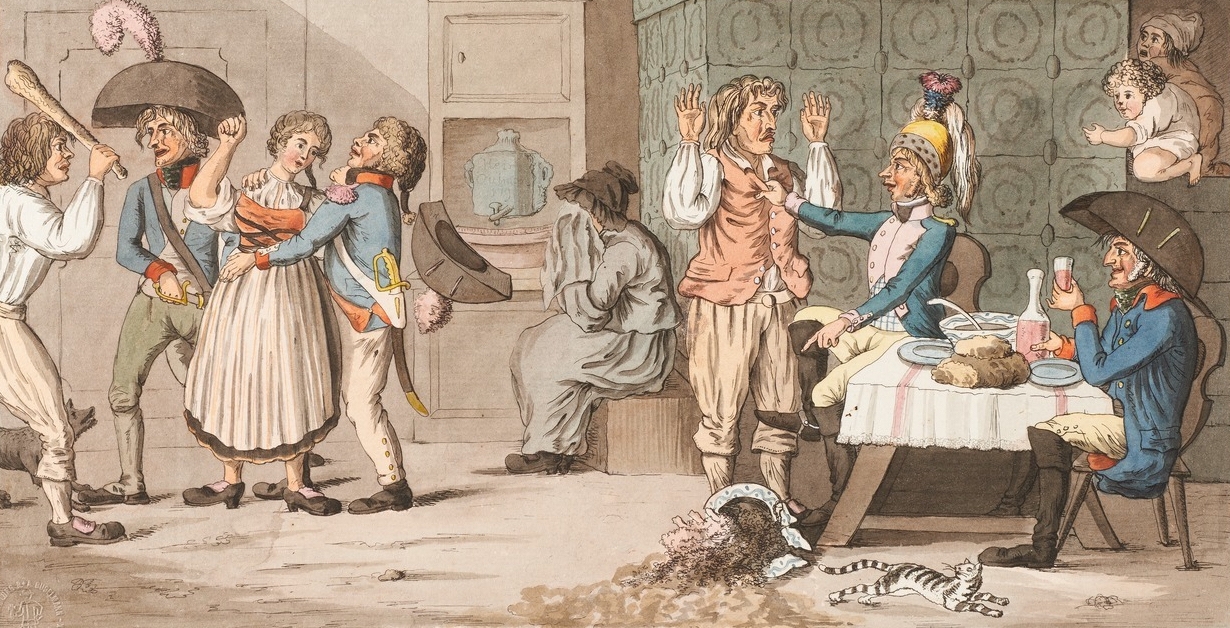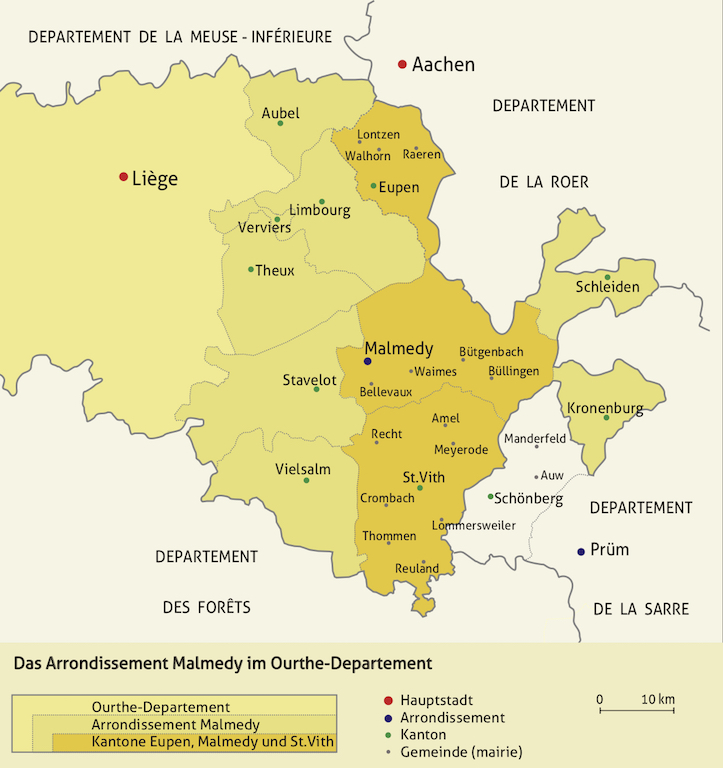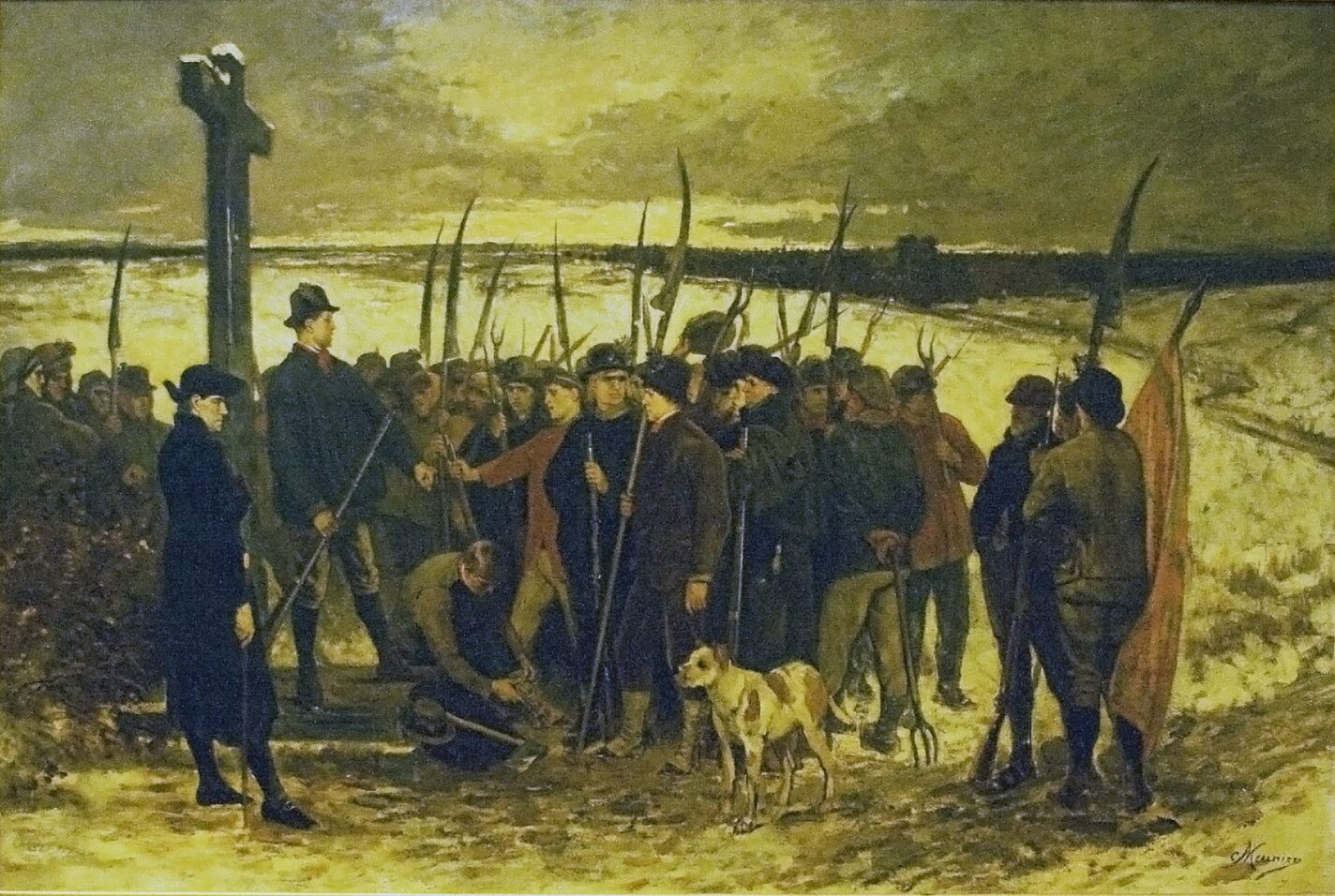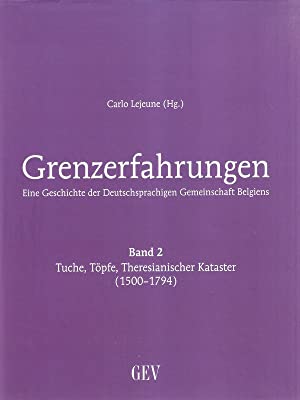-
The year 1789 marked the beginning of the French Revolution. In 1795, France annexed what is now Belgium, Luxembourg, and the area on the left bank of the Rhine. The revolutionaries changed everyday life and the rules of the game in politics by introducing a new constitution, new legislation, and administrative reforms. The Declaration of the Rights of Man and of the Citizen of 26 August 1789 conferred natural and inalienable rights on human beings from birth. These included equality before the law, the protection of property, the presumption of innocence, protection against excessively harsh punishments, as well as the division of legislative (parliament), executive (government) and judicial power (courts). In addition, the Civil Code was introduced, the French code of civil law, to which every judge now had to adhere. This put an end to arbitrary decisions on sentencing.
None of this had existed in Europe before the French Revolution: rights were often only granted to the nobility and the clergy by treaty, and these rights had to be reconfirmed by each new ruler. Many people were not free, but still bound by serfdom. People were not equal, but had very different rights, according to their respective status. People were not treated equally in court either. Decisions and sentencing depended on the discretion (and sometimes the mercy) of the judges.
Social status very much determined how individuals experienced these innovations of the revolution. In general, the clergy and nobility lost wealth and power in favour of the bourgeoisie. The (large) urban, progressive bourgeoisie benefited the most. In rural areas, at least merchants, doctors, lawyers, and administrative officials had much better from then on. Day labourers, farmers, or craftsmen enjoyed new rights in theory, but any real and noticeable impact arising from those was considerably delayed. In everyday life, they did not have the impression of being beneficiaries of the revolution.
What did this mean for what is now East Belgium between 1795 and 1815?
For the first time in history, the northern part, the Eupener Land, abd the southern part, today’s Belgian Eifel, as well as the area surrounding and including Malmedy were now part to a single, modern administrative unit: the Ourthe Département.
The local significance of the Revolution became clear at an early stage: the nearby town of Spa, one of the most important spas in Europe, turned into a centre for refugees fleeing the Revolution by 1795. Nobles from all over France passed through the town, stayed there for a few weeks, and then moved on westwards. Many cloth manufacturers from Eupen also initially fled to the west, yet returned to Eupen a short while later.
The former beneficiaries of the Ancien Régime, the nobility and the clergy, were the losers of the Revolution. Hence, most of them rejected the political reforms. Yet, at first, the vast majority of the rural population of today’s East Belgium did not see any advantages either in many innovations, even though they had borne the burden of the old, feudal system. This seems strange to us citizens of the 21st century as we consider the French Revolution to be the foundation stone of our modern democracies.
When looking at the economic development in Kelmis, Eupen and today’s Belgian Eifel, it becomes clear that for many people material interests were more important than the ideas of the French Revolution.
In Kelmis florierte der Galmeiabbau, während die große Zeit des Raerener Steinzeugs endgültig vorbei war. Die Eupener Tuchmacher ihrerseits mussten neue Absatzgebiete suchen. Der junge Schneiderlehrling Johann Caspar Scheen aus Eupen schrieb über den Einzug der Franzosen in sein Tagebuch: „Den sobald die Franzosen unsere limburgensische Gegent nur betretten hatten, finge das Wullenfabrick (Tuchmacherei A.d.V.) schon an zu schwächen, und dieses ist das Einzige, wovon unsere vätterliche Gegend leben muß, den wen das Wullen-Fabrick nicht floriert, so liegen alle Handelschaften Noth […].“
Scheen äußerte deutliche Zukunftsängste. Einige Jahre später notierte er: „Nachdem wir die schlechte Jahren erlebt hatten, haben wir auch widerum etliche guten gehabt; dan in dem Jahr 1795, 1796 und 1797 giengen die Fabricken und Handelschaften sehr gut – dan, wie vor gesagt, die Baasen (Meister A.d.V.) gaben sechs bis sieben Merck für einen Stranck zu spinnen, und alles war zimlich wollfeil und einen civilen Preiß.“
In Kelmis, calamine mining flourished, while the great age of Raeren stoneware was over. The Eupen clothiers, for their part, were forced to look for new outlets. A tailor’s apprentice at the time, young Johann Caspar Scheen from Eupen, wrote about the arrival of the French in his diary: ‘As soon as the French had entered our Limburg region, the cloth-making industry began to weaken, and this is the only thing our rural region has to live on, because if the cloth-making industry does not flourish, then all trades are in trouble […].’
Scheen clearly expressed fears of the future. A few years later he noted: ‘After we had experienced the bad years, we had also seen some good ones; then, in the years 1795, 1796 and 1797, the factories and trades went very well – then, as said before, the Baasen (masters, TN) gave six to seven Marks for a skein, and everything was very cheap and a civil price.’
Economically, the Eupen cloth manufacturers experienced their greatest heyday until 1815. Textile workers, spinners, and shearmen received good wages, and the cloth manufacturers did excellent business. Yet, the diary of the young tailor’s apprentice also shows us that the innovations of the French Revolution, which we today regard as great achievements, played no role for him. For him, sufficient wages and his own prosperity came first.
On an economic level, things were quite different in the Eifel and the Malmedy area in Wallonia. In this rural region, people lived mainly from agriculture, the leather industry, and the intermediate trade between the Rhineland and the Ardennes. A revival of the economy was largely absent. Perhaps this is why many reforms met with great rejection among the Catholic-conservative population.
1798 begann der Klöppelkrieg.
In 1798 the peasant revolt began.
Young peasants in particular rose up against the French, who demanded excessive taxes, introduced conscription, and closed the churches. In what is now Luxembourg, the German Eifel, but also in Sankt Vith, Büllingen, Amel, Bütgenbach, Burg-Reuland, and Malmedy, the rebels gathered together with the simplest weapons. A few French army units put down the uprising within a few weeks.
The French occupiers remained generally unpopular. Louis François Thomassin, a tax collector from Liège in the services of the French administration, wrote in his memorandum ‘Mémoire statistique du Département de l’Ourthe’ in 1806 and 1813 about the Eifel-Ardennes region: ‘The inhabitants of these cantons have given up hope of ever being able to improve their agriculture. They are convinced that all previous attempts have worked to the disadvantage of the farmers who had undertaken them, and the latter have been forced to return to their traditional habits.’
What might these simple country people have thought? If, according to Thomassin, they could not imagine being able to improve their economic situation, were they at all able to foresee the consequences of the political innovations? Where and how were these country people reached and touched by the revolution?
Older historical works, dating back to the 19th century in particular, show that very many authors rejected the French Revolution, in whole or in part, for ideological reasons. They strongly internalised the rejection of the people at that time and at the same time idealised the mourning for the old order in the Austrian Netherlands. The best example is the peasant revolt of 1798. Its participants were stylised as heroes, especially in the interpretation of the church. The reason is that they had fought against modernity. Most of them, however, had primarily fought against conscription into the French army or against taxes that were too high.
Historical societies and historians gave preferential treatment to this phase of East Belgian history, notably after the Second World War, as it was considered politically innocuous. Since the 1980s, however, Alfred Minke’s work has shed a more nuanced light on the consequences of the French Revolution in East Belgium.
Disenchantment with politics is omnipresent in public discussions of our time. Are the critics only dissatisfied with the work of politicians, or with our democracy? Do politicians still stand up for human rights and democracy today? Is it looking for the best possible solutions for people to live together? Do populist parties also stand up for human rights? And do they also indirectly invoke the ideals of the French Revolution?
Quellenhinweis
Source references
The quotation from the tailor’s apprentice Johann Caspar Scheens is taken from:
Alfred Minke, Die Französische Revolution aus der Sicht des Johann Caspar Scheen, Schneiderlehrling aus Eupen, in: Geschichtliches Eupen 24 (1990), pp. 19-48.
The quotation from the tax official Louis François Thomassins is taken from:
Josef Dries, Landwirtschaft auf dem Weg zur Monokultur. Klima, Märkte und Strukturen als beständige Herausforderungen, in: Carlo Lejeune (ed.), Grenzerfahrungen. Eine Geschichte der Deutschsprachigen Gemeinschaft Belgiens, vol. 3: Code civil, beschleunigte Moderne und Dynamiken des Beharrens (1794-1919), Eupen, 2017, pp. 142-163.
-
Emergence of parishes
French Republic
Incorporation of East Belgium into the French Republic
Municipal education
Beginnings of municipal education under state supervision
Vaccination
First vaccination against smallpox
Cloth manufacturing
Heyday of cloth manufacturing in Eupen
Pasant revolt
Conscription
Introduction of compulsory military service
Napoleon
Coup d’état in France; Napoleon Bonaparte becomes sole ruler
Parish division
Inheritance law
Inheritance law is reformed in the ‘Code Civil’, real division is introduced
Chamber of commerce in Eupen
Secondary school in Eupen
Congress of Vienna
The Congress of Vienna assigns the territories around the towns of Eupen, Malmedy, and Sankt Vith to the Kingdom of Prussia. Neutral Moresnet is created.
-
-
![Grenzerfahrungen Band 2]() Carlo Lejeune (ed.)
Carlo Lejeune (ed.)Grenzerfahrungen. Eine Geschichte der Deutschsprachigen Gemeinschaft Belgiens.
Band 2: Tuche, Töpfe, Theresianischer Kataster (1500-1794), Eupen 2015.
-
![grenzerfahrungen-band3]() Carlo Lejeune (ed.)
Carlo Lejeune (ed.)Grenzerfahrungen. Eine Geschichte der Deutschsprachigen Gemeinschaft Belgiens.
Band 3: Code Civil, beschleunigte Moderne und Dynamiken des Beharrens (1794-1919), Eupen 2016.
-

1795-1815
French period
The French Revolution laid the foundations for our modern democracies and the possession of inalienable human rights. In a court of law, everyone has the same rights as any other of their fellow citizens, who are all protected from arbitrary interference by the state. Everyone enjoys the right to freedom of expression. All these achievements and many more are a legacy of the French Revolution. It is therefore worth taking a look at this period in history. Using the history of East Belgium as an example, we will show below why the French Revolution laid the foundation for a Europe of legal security and why we should work to preserve these rights.





